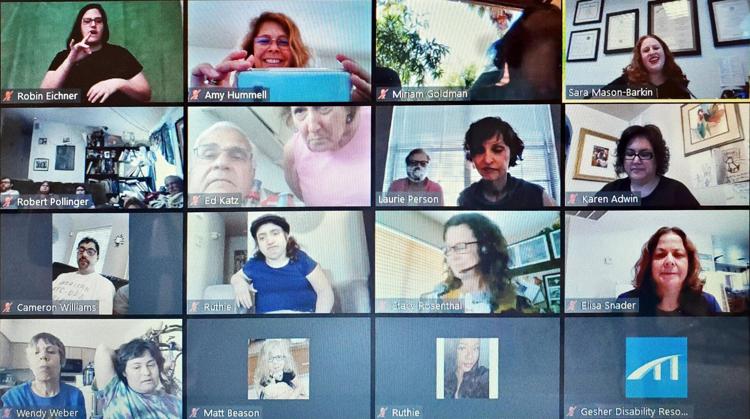Photo: Gesher’s pivot to online programming included Simchat Shabbat services with Congregation Beth Israel. Photo courtesy of Gesher Disability Resources
Amy Hummell
Sep 9, 2020
Jewish News – Greater Phoenix & Northern Arizona
The High Holidays are a special time of year. They can also be stressful, especially if you or someone in your family has a disability.
The original mission of Gesher Disability Resources was to ensure that Jewish camps, day schools and religious schools were inclusive. In some cases, this meant providing training for teachers and madrichim, and in other cases it meant reviewing the physical space.
Are the doorways wide enough for someone using a walker? If there are steps into the building, can a ramp be set up for a wheelchair? Did aisle seats get saved for someone who cannot walk very far or seats up close for someone who can’t hear very well?
Some disabilities are apparent, but some can’t be seen with the naked eye. That is the reason to think about the whole person and providing accommodations that individuals can choose to use if they need them.
In 2007, Gesher — then known as Council For Jews With Special Needs — and Congregation Beth Israel introduced Simchat Shabbat to the community. This “no shush” service was created with and for individuals who have special needs.
It was shorter in length, took place in an accessible facility and included a Torah service. In the spring the service talked about Purim and Passover, and in the fall everyone got a taste of the High Holidays. Eventually, sign language interpreters attended Rosh Hashanah and Yom Kippur services at Temple Emanuel of Tempe and Temple Solel.
Then came COVID-19, causing all of us to learn more about “the pivot” than we could have ever imagined. Most synagogues will host High Holiday services online for 2020.
While ramps may not be needed for wheelchairs, there are other items to consider when setting up an inclusive service.
Consider the following ideas from respectability.org:
Let your congregants know if you are providing accommodations by inviting them to make requests for assistance. Use a statement like the following: “Accommodation requests should be directed to [name here] at [phone number here], no later than [deadline — if appropriate — here].”
Invitations and announcements should list service length, format of the event and ensure images and logos have alt text — image descriptions — for people who are blind and use screen readers.
If you are using documents or a PowerPoint presentation, distribute them to your attendees in advance. This includes online source sheets for sermons or discussions.
When there are multiple voices, the best practice is for each person to say their name every time they begin speaking. Include potential modification statements like “Please rise if you are able.”
When setting up the call/service, turn on “live captioning” as an option. In Zoom, this means the individual chooses to show the closed caption — text version of the spoken words the speakers and clergy are using — at the bottom of that individual’s screen. Note: Subtitles only capture words. Captioning includes non-spoken information like [laughter] or [music].
It is helpful to call out page numbers, but if an individual has altered the document to make the print larger or work with a screen reader, page numbers may no longer be synched. It is recommended to call out both the page number and the first few words of a paragraph. For example, “Let’s go to page ‘x’ with the paragraph that begins with the words…”
Children and adults with cognitive or learning disabilities might not be able to read the prayer book without supports. Gateways is a website with free resources that utilize picture communication symbols. Find them at jgateways.org.
When in doubt, do not assume someone needs assistance — just ask. JN
Amy Hummell is the executive director of Gesher Disability Resources.




